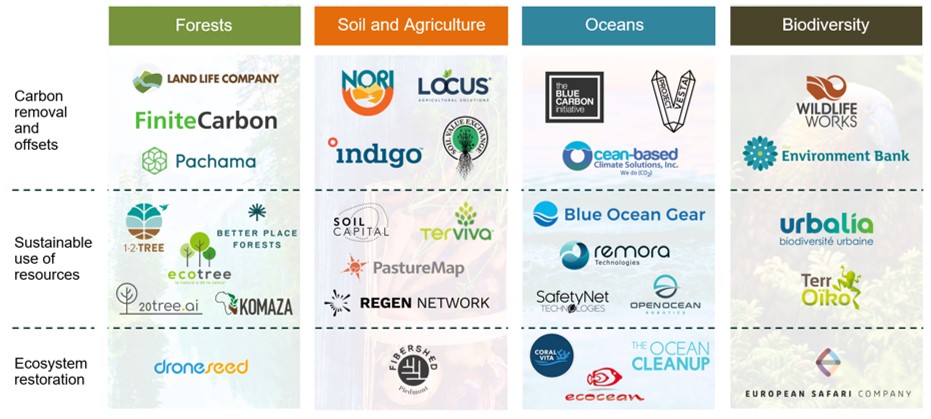Carbon Removal and Nature-Based Solutions
To combat the climate crisis and build a new economy, an increasing number of innovators and investors are turning to nature-based solutions to sequester carbon, manage land and restore ecosystems. Nature-based solutions typically solve multiple challenges at once. They create highly productive and diverse ecosystems while being very effective at specialized tasks such as capturing carbon or recovering from extreme weather events. These solutions can increase resilience and well-being, plus they tend to entail lower operating costs despite early transition costs. While many nature-based solutions tend to be on a local scale financed by public money and foundations, some underlying technologies and business models can be scaled up, creating highly attractive venture opportunities.
In this insight, just ahead of our second edition of Cleantech Interactive, Investing in Nature, on 17 June, we present the overall landscape of nature-based solutions, diving into the two main areas opening up to investment: forest-based carbon removal and regenerative agriculture.
Investing in Nature: Venture Opportunities
Venture capital is well-adapted to financing technologies and business models that can scale across large geographies or customer bases. We see three areas of nature-based solutions where that applies:
- Carbon removal An increasing number of countries and companies are committing to net neutrality, with goals set for between 2030 and 2050. While a significant share of CO2 savings should come from more efficient operations, carbon capture and compensation are bound to boom in the next few years. Industrial carbon capture is costly and difficult, but natural sequestration can be encouraged in forests, agriculture and oceans. One of the top opportunities for venture-backed companies is to scale up transaction networks between carbon storage projects and offset buyers.
- More sustainable use of resources Decades of deforestation, chemistry-intensive agriculture and overfishing have significantly degraded natural ecosystems. Large opportunities exist for start-ups to develop tools to track ecosystem health and technology to minimize harm to ecosystems. Some start-ups are also capitalizing on public interest and opening up investment opportunities to private individuals. These are businesses of tomorrow, creating a symbiotic and productive partnership with nature.
- Ecosystem restoration Healthy ecosystems are highly productive, create well-being for their users and are a magnet for tourists seeking refuge in nature. A number of start-ups are working with local authorities and the eco-tourism sector to make ecosystem restoration desirable and profitable. Some are working with coastal communities and hotels to regenerate coral reefs, while others are helping forests expedite recovery from recurring wildfires.
Here is a summary of the Investing in Nature venture landscape:

Key Opportunities
Forest-based Carbon Removal
Reforestation-based carbon offset projects have become increasingly attractive to corporates looking to showcase green credentials and meet net neutrality goals. This is particularly true of large polluters such as oil and gas companies and airlines. For example, Shell recently launched a carbon offset scheme for its fuel customers along with net neutrality goals.
In 2018, issuances of afforestation and reforestation voluntary offsets rose by 342% and remain the most popular type of offset despite cheaper alternatives. Some emerging companies such as Land Life Company or Finite Carbon are acting as project developers or aggregators, selling high-end credits to large corporates, making sustainable reforestation profitable.
Others are using technology to provide services such as forestry monitoring to improve protection and to reduce operational costs. For example, Cleantech Group’s 50 to Watch company Pachama has developed satellite and LiDAR-based carbon storage estimation software to enable remote calculations of carbon sequestration and encourage forest conservation and expansion. In January 2020, the company raised $4.1 million in a Series A round led by Saltwater Capital and Lowercase Capital.
Regenerative Agriculture
Regenerative agriculture aims to improve soil whilst maintaining profitable farming practices. Various methods are employed including agroforestry, silvo-pasture, no-till farming, the use of biological inputs to replace chemicals, rotational grazing and other farming process improvements. The aim is to increase biodiversity and promote soil carbon and nutrient content, improving long term yield and agricultural sustainability.
Emerging companies are creating new revenue streams for farmers by helping them sell carbon credits for adopting regenerative practices. Companies such as Nori and Indigo have created marketplaces to scale up intermediation between farmers and off-setters. These offsetting schemes are supported by new tools such as Soil Capital’s MySoilCapital which tracks, measures and models the potential returns of moving to regenerative agricultural practices, thus reducing the farmer’s risk when deciding to make the switch. These innovations are offering new opportunities for venture investors looking to scale nature-based solutions.
Corporations in food and agriculture are feeling pressure from consumers for greater transparency and more responsibly organized supply chains (the latest example is from shoe maker Timberland). This is compounded by regulators increasingly legislating against non-regenerative practices, such as the EU’s decision to cut chemical pesticide use by 50% over 10 years. Business model innovations, alongside innovation in verification and data analytics, will be the key competitive differentiators to ensure adoption of new methods is both profitable and sustainable.
Interested to learn more? Join us on 17 June at Cleantech Interactive to meet executives from Land Life Company, Nori, Soil Capital and other pioneers in nature-based solutions – and the investors backing them.
We look forwards to seeing you there,
Jules Besnainou, Director, Cleantech Group
Chris Sworder, Senior Analyst, Agriculture & Food
Holly Stower, Analyst, Resources & Environment


